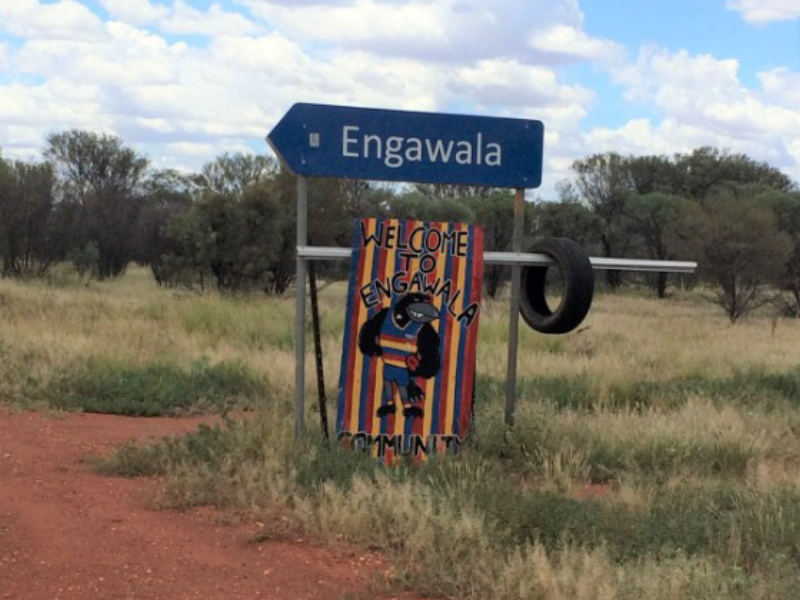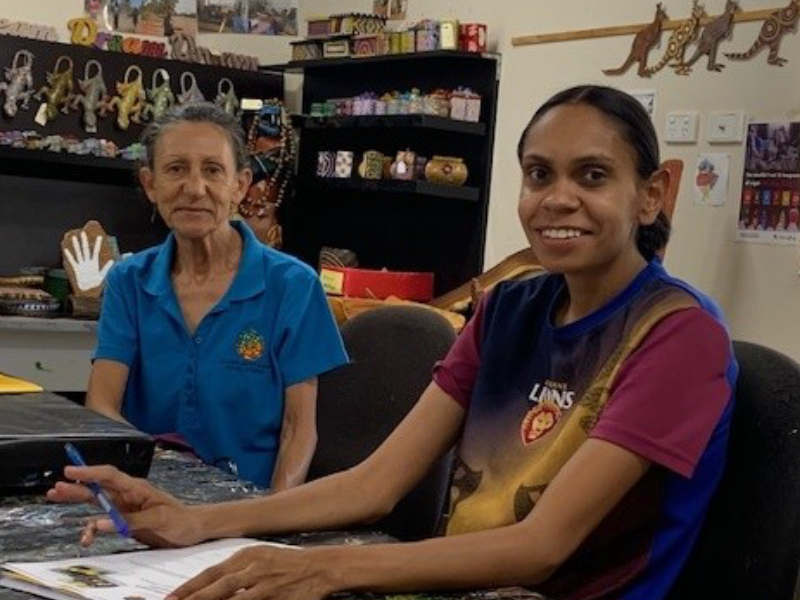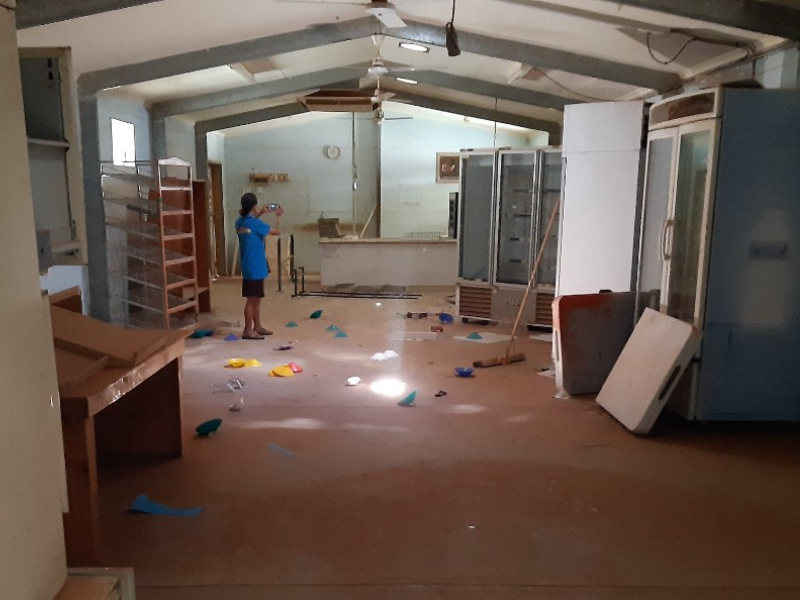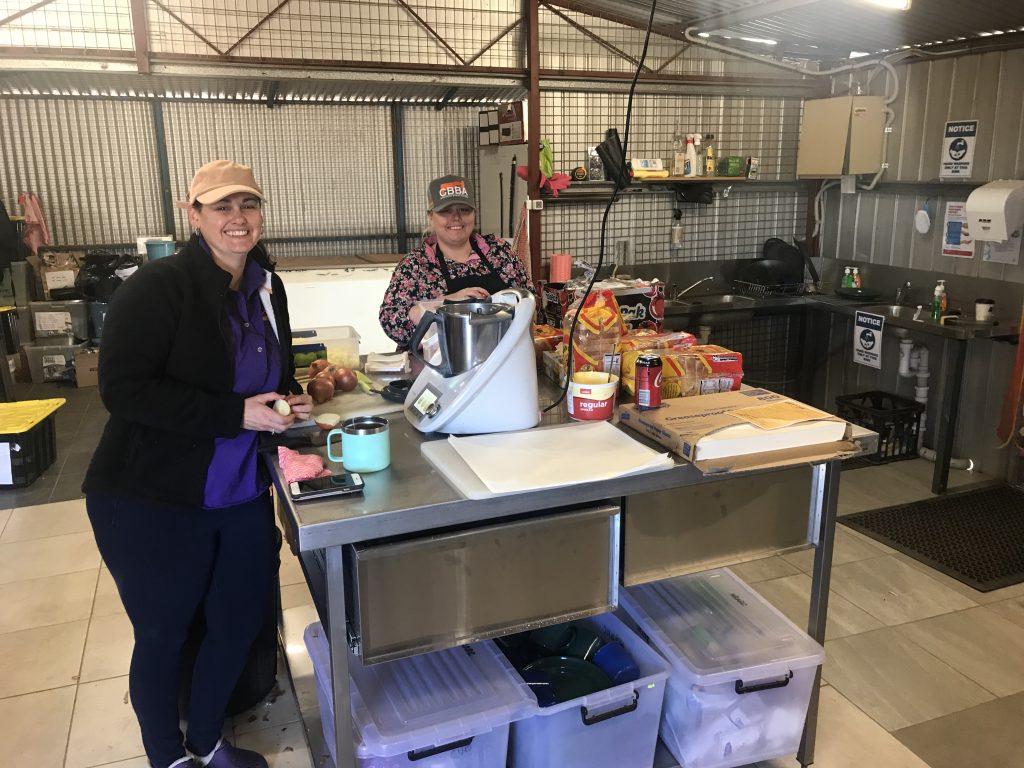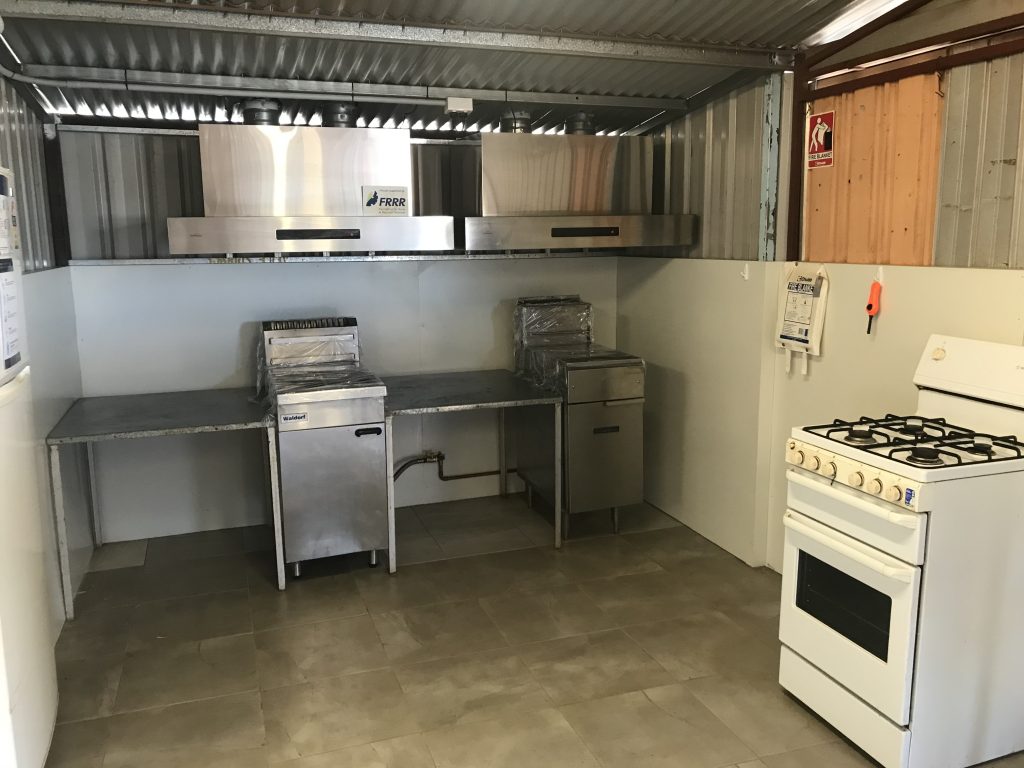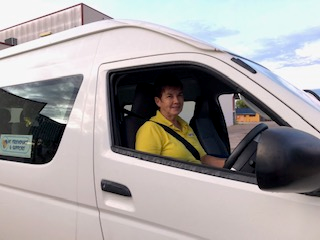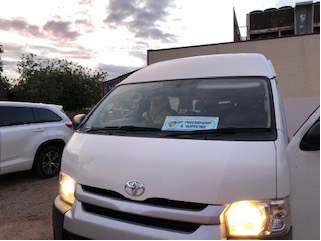Foundation for Rural & Regional Renewal (FRRR)
Engawala, also known as Intiarntwa, is a remote community 200 kms northeast of Alice Springs. It has a women’s centre, childcare facility, school, remote health clinic, Council office and recreation hall with a youth program servicing the 150 people that live there. Excitingly, it will soon also be home to the Engawala Art Centre.
The Engawala Art Centre Aboriginal Corporation (EACAC) formed in 2019 and is overseen by a committee of five. Twelve local artists have been making the 400 km round trip to Alice Springs to sell artworks, with the cost of travel a drain on their income. There was agreement that it would be ideal if they had their own Art Centre where they could paint and have a gallery to sell to the public.
Long-term impacts
The benefits of a strong arts and crafts sector are far-reaching. Establishing and building the capacity of Indigenous art centres goes a long way to sustaining remote communities. They play an indispensable role – as a place of cultural leadership, language and identity, community engagement and are often also a provider of essential social and wellbeing services. They are a link to the mainstream art market and, when operating effectively, these enterprises can be a key source of income, training and employment.
Recognising this, the EACAC developed plans for a dedicated Art Centre in the community and set about making it a reality. In 2021, they applied to FRRR’s Strengthening Rural Communities program (Small & Vital stream) for a grant to cover administrative costs during the start-up phase. This would cover subscriptions to the Stories, Art, Money (SAM) software program; membership of Desart, the peak Arts body for Central Australian Aboriginal Arts and Crafts centres; telecommunications equipment; promotional signage; and art materials.
With strong letters of support and partnerships in place, the application was successful, and the group was awarded $8,595, thanks to the Yulgilbar Foundation.
Getting it right with upskilling and the tools for the job
The EACAC maintains that the most valuable outcome has been the employment and training of an arts worker. Once a week, an experienced volunteer has visited the Engawala Community to do training, with other training completed remotely, via the new phone. This meant the project could continue in between visits. The Centre’s arts worker now has all the basic skills for running an office and working with the SAM database, even attending an advanced course in using SAM at Desart in Alice Springs.
“While we have secured funding from the Commonwealth Department of the Arts to continue her employment, we would not have got to this stage without support from FRRR. Their grant to our Art Centre is allowing us to go from strength to strength.
“The equipment purchased through the grant has also made a critical difference. We cannot operate the Centre without the phone, and the iPad and scanner have made the recording of artworks for upload to SAM possible. Previously this was done using a borrowed mobile phone, which was very time consuming and unsatisfactory.”
Building for the future
While the renovation of the old shop for the new Centre was heavily delayed, the group sees the silver lining – they had had extra time to prepare to hit the ground running.
The EACAC is now actively promoting of the Centre which was opened by the NT Minister for the Arts in August this year., The Centre has worked with nearby Gemtree Tourist Park to provide short tours to see the artwork billboards on the Plenty Highway followed by a visit to the Art Centre. The billboards, some depicting work by Engawala artists, are part of the Outback Way Outdoor Gallery project which was also supported by FRRR.
The Art Centre project has also helped to open up new markets, bringing with it more resources to continue to grow the Centre. The artists sold an impressive $13,000 worth of Engawala artists’ paintings in one day at the Desert Mob Marketplace in Alice Springs, assisting them with paying for items they could not secure funding for such as electricity and insurances.
“While not our biggest financial partner (the bulk of our fundraising was for the renovations), FRRR’s contribution towards our project was critical at an important development phase. Many projects fail at this juncture between getting the ideas and finding substantial financial support. In a commercial sense, the funding was critical in terms of kick starting the project.
David (Taffy) Denmark, volunteer Business Advisor
“We appreciate the flexibility FRRR has shown – something not evident in some government funding programs. This is one of the major strengths of the philanthropic movement.”
A huge congratulations to the committee and all those involved in the project to date. By deciding to professionalise the management of the Arts Centre, this group is building a place for employment, training, business opportunities, tourist-based income, cultural maintenance, pride, “a laugh and a cuppa”, and thus strengthening the Engawala community for the future.
Wagait Beach is located on the Cox Peninsula just west of Darwin and is accessible by ferry (15 mins) or road (90 mins). Young people make up around 14% of the 461 residents and beyond seasonal sports, there are very few organised activities on offer locally. Parents and young people alike had been keen to increase access to drug and alcohol free activities which would build skills and support emotional, social and physical wellbeing and in 2021, Wagait Shire Council supported to the creation of the Wagait Youth Group.
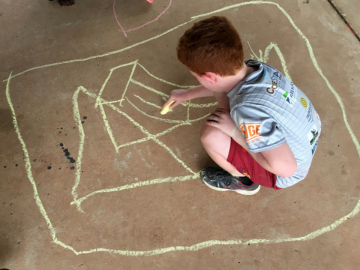
The Council received a Strengthening Rural Communities grant of $6,000 to assist with establishing their youth program that focused on building more opportunities in the community for young people including the co-design of a local Skate Park. Across four skate workshops, the children designed, built, and decorated portable ramps that went into immediate use, while plans are now well underway for the permanent skate park. Beach cricket, movie nights and discos for the school aged children have since followed.
In addition to a more physically active lifestyle, the young people felt listened to and have become more engaged and active in civic affairs. A collaboration developed between Health Lifestyle Seniors participants and the young people which saw the seniors sharing their skills such as cooking and sewing, which in turn built intergenerational bonds of appreciation and understanding.
Furthermore, the Council employed a Year 12 student for 12 months in the role of Youth Development Officer. This role takes the lead on designing, delivering, and reporting on the ongoing youth program. The Council hopes to continue offering this position annually and expand it into an internship, covering other aspects of council work and community service to develop youth leadership skills locally.
Ramingining, an Aboriginal community home to around 870 people, is situated on the edge of the Arafura Swamp in Arnhem Land, approximately 560 kilometres east of Darwin in the NT. The community is made up of mainly Yolngu people.
Ramingining artists and community members, through the Bula’Bula Arts Centre, wanted to provide more activities that strengthen the community’s connection to their cultural roots, knowing this is integral to people’s health and wellbeing. They also wanted their young people to learn to practice and celebrate their culture from Elders.
Following Cyclone Lam in 2015, the community successfully lobbied for a new cyclone shelter. The completed shelter has multiple uses including as recreation centre, a space for youth programs, a basketball stadium and the occasional movie theatre. The concrete block building was practical but somewhat bland, without representation of the local Yolngu culture.
Thanks to a $9,973 Strengthening Rural Communities grant, funded by the Bertalli Family Foundation, the Bula’Bula Arts Centre was able to bring together the older and younger generations of Yolngu people to commemorate their culture through the creation of two large public murals on the outside walls of the cyclone shelter.
Yolngu culture is built on a kinship system that consists of two moieties, Dhuwa and Yirritja, and these are the foundations of the skin systems, totemic relationships, storylines, songlines and more. Each mural, approximately three by five metres, honours one of the two moieties. The murals are a huge achievement visually depicting 20 unique stories. Twenty-one Bula’Bula artists, alongside about 20 Ramingining youth, created the murals over several sessions during the January 2022 school holidays.
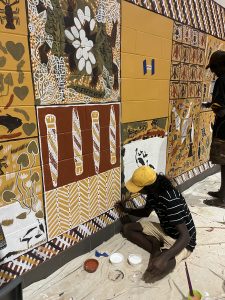
The painting sessions were observed by many other community members, who came along to see what was happening. The murals have been highly welcomed by the community, bringing smiles and words like letchu (awesome), manymak (great) and yolngu rom (our culture).
The younger people have developed a better understanding of their culture, and the broader community has a greater sense of pride and self-esteem from the creation of a more culturally appropriate meeting place. The murals also act as a teaching tool, with many families coming to show their children and tell the culturally significant stories.
The Bula’Bula Arts Centre is a locally governed, owned, and operated Aboriginal Corporation situated in the heart of the community and plays an important role supporting more than 150 artists to maintain and strengthen their cultural practices. It also offers training, education, career pathways and enterprise opportunities, along with providing social services contributing to the social and physical health of the community.
The most successful and proudest part of the project for the Bula’Bula Arts Centre was the engagement of Yolngu people from the initial concept to execution and finally, the outcome and ongoing nature of keeping culture strong.
Dhuwa wall artists included: Gary Smith, Dorothy Djampilil, Daniel Warrulukuma, Evonne Rraraypum, JB Fisher, Joy Borruwa, Billy Black, Joy Burruna, Lisa Gurrulpa and Shannon Ashley.
Yirritja wall artists included: Joanne Mombuyngu, Selena Munguluma, Peter Gambung, Romeo Gaykamangu, Bobby Bununggurr, Andrew Malibirr, Johnny Malibirr and Evonne Gaywrri.
Artist helpers and art workers: Selena Galang, Kylie Pascoe, Steve Malibirr, Ross Dhaparuwuy and Jasmane Malibirr.
The East Arnhem Regional Council authorised the creation of the murals and also provided staff time in-kind to assist with the project.
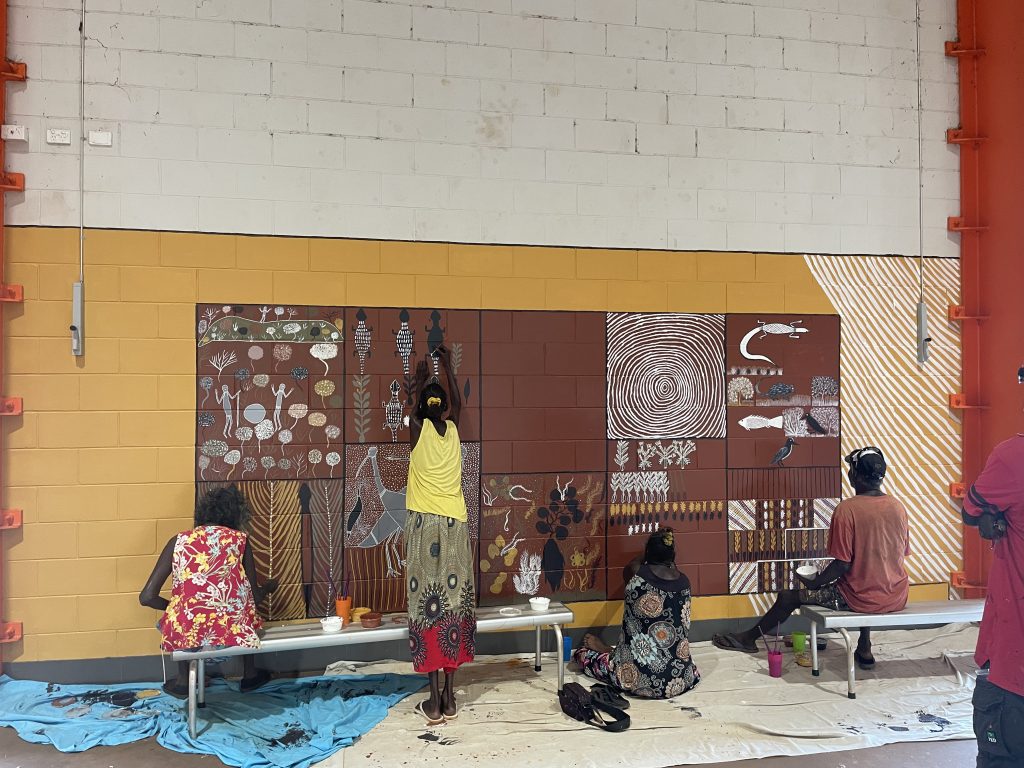
A grant originally intended to help the Gong-Dal Aboriginal Corporation increase opportunities for the Gapuwiyak community in East Arnhem Land was partially diverted to help the community respond to COVID.
The FRRR Westpac Rural Communities Grant of $10,000 was originally intended for tourism business education and mentoring programs in the Northern Territory, to support the organisation in its capacity and capability as it embarked on a niche tourism venture. However, as 2020 unfolded, the organisation recognised that there was a more urgent need to support the community in managing and responding to the emergency that COVID had created.
General Manager Juli Cathcart said that half the grant was used to employ experienced facilitators to run workshops, develop resources and support community engagement with the Gapuwiyak and Homelands COVID-19 Dhäwu Ganamirr Mala (COVID-19 Both-Ways Community Engagement Group).
The second half was directed toward the original purpose and used for facilitating workshops, recording and documenting the Miriŋu Dhukarr – Warriors’ Walk – cultural tourism project.
The COVID-19 response group was formed by Yolŋu leaders to provide intercultural advice to government agencies and other stakeholders and ensure culturally safe and appropriate community engagement.
The facilitation included education and training for 15 local Yolŋu people about COVID and a Local Pandemic Action Plan and Outbreak Management Plan. It included key materials in plain English and Djambarrpuyŋu, the local Indigenous language, as well as ‘just-in-time’ advice and support for the local police, clinic and other stakeholders.
This work empowered 900 local Yolŋu community residents in Gapuwiyak and Homelands by giving them knowledge and understanding they needed to keep their families informed of COVID and the NT government responses.
“This ensured a highly responsive and culturally safe COVID Local Pandemic Action Plan, and directly contributed to the development of respectful and trusting relationships between local Yolŋu leaders and community members, and our stakeholder organisations and employees in relation to the local management of COVID and safety of Gapuwiyak and our Homeland communities,” Juli Cathcart said.
“Feedback received was that as a result of this work, local Yolŋu community members felt respected, well informed, heard, assured, secure and safe in a time of great uncertainty, which improved everyone’s quality of life. This work was also key in the development of trusting relationships between stakeholders and Yolŋu community members. The very high uptake of vaccinations in Gapuwiyak and Homelands (80% of eligible community members) compared to other Aboriginal communities and the rest of Australia in 2021 can also largely be attributed to this work. This is a potentially life-saving outcome in a community where chronic disease placed at least 60% of our population in extreme danger if they should contract the coronavirus.”
The second part of the funding supported the development of a museum and a Yolŋu cultural tourism initiative comprising a series of heritage trails across Arnhemland. They follow the foot patrols of the Miriŋu (Yolŋu warriors) who formed the first Northern Reconnaissance Unit with Dr Donald Thompson and defended the Northern coastline during WWII. A high-quality documentary about the Miriŋu Dhukarr Project will also to attract funding to enable the development of this Yolŋu cultural heritage trail and tourism initiative that is of huge local cultural and historical importance as well as of National historical significance.
It is also funding ongoing workshops to enable Yolŋu Elders and Leaders to work with both Yolŋu and Balanda soldiers and veterans, as well as young Yolŋu people to ensure the intergenerational transfer of important and endangered Miriŋu cultural traditions, stories, knowledge and skills.
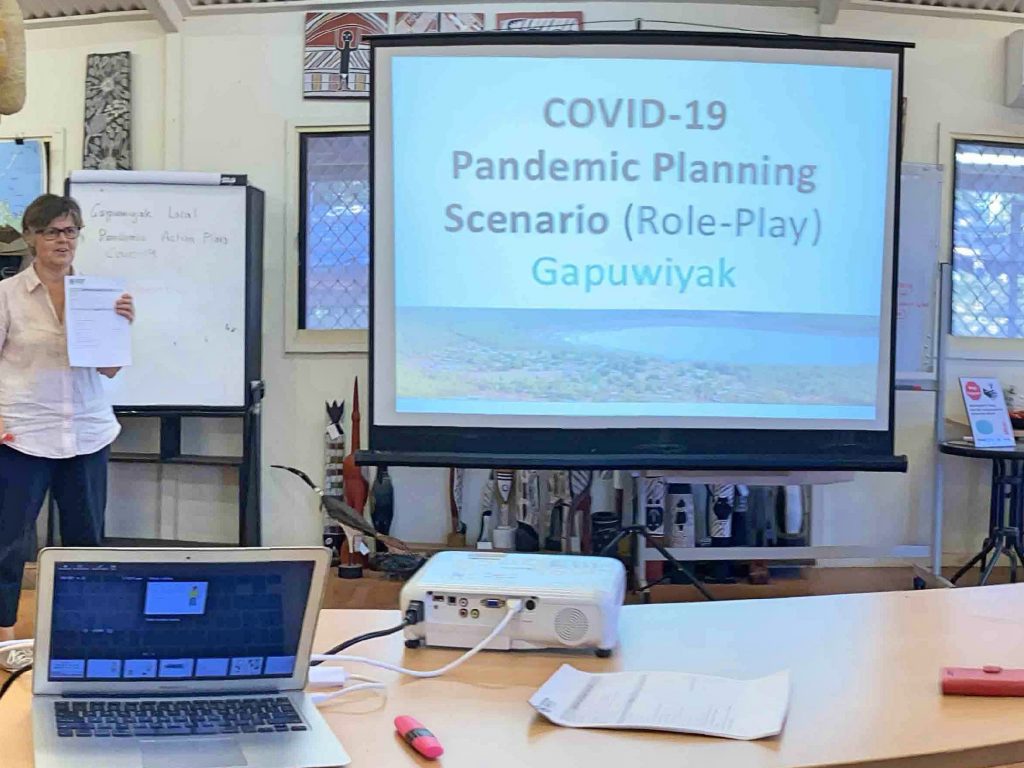
In the East MacDonnell ranges of the Northern Territory, The Harts Range Amateur Race Club (HRARC) hosts a 73-year tradition – an annual bush sports weekend that attracts more than 2,500 visitors to this very remote community. It is one of few events that brings this extremely disadvantaged community together, to connect socially and facilitate community wellbeing.
The Club’s facilities are also used for Central Land Council meetings, consultations, and community events. But the canteen, which is run by Isolated Children’s and Parents Association, was in much need of repair. The Club received $10,000 through the Strengthening Rural Communities program, thanks to the support of the Tim Fairfax Family Foundation. They used the funding to purchase two domestic rangehood exhaust fans plus fittings, and for a roof spinning ventilator for over the BBQ area. In addition, they were able to attract in-kind support from other organisations, members and volunteers in the community, enabling a full upgrade to the canteen. Mark Coffey, the Club’s Public Officer, reported that the project brought together volunteers, most of whom live more than two hours away, local businesses and the Atitjere community for a project that will provide an improved working environment for the community for many years to come.
“For everyone, COVID-19 has made this year a challenge, so it was great to be able to form such a good partnership between HRARC, Scope and FRRR, which made this project so much easier to deliver especially for our volunteers. “We are proud that this kitchen upgrade will ensure a modern and more functional kitchen for years to come.”
Mark Coffey, HRARC Public Officer
The challenge of attracting volunteers to support charitable organisations serving the community is universal, but exacerbated further in remote communities where the potential pool from which to recruit helpers is that much smaller to start with.
This was the challenge NT Friendship & Support Inc (NTSF) faced when they received a grant from FRRR to help them with their volunteer recruitment drive. The group’s mission is to provide professional care and promote an accessible, inclusive and supportive community.
The organisation has a waiting list of vulnerable Katherine region seniors seeking to be paired with a volunteer to assist them, from attending medical appointments and support services, to simply joining them for a cup of tea and a chat. Community members access the service via a referral from a regional assessment team and to be eligible must be 65 year or older, or 45 years or older for Indigenous community members.
Katherine currently has three aged care facilities, all of which are at capacity, with the only other alternative residential aged care facility located 330 km away in Darwin. NTFS has 25 people on the waiting list, five of whom are a high priority for the service. These identified seniors are at risk of isolation and loss of independence. Research suggests that, whenever possible, it is important that people have the opportunity to remain in their communities, connected to country, and independent as long as possible.
NTFS had hoped to recruit and train ten new volunteers, and used the $4,090 grant from FRRR’s Small Grants for Rural Communities program, funded by The Yulgilbar Foundation, to run an advertising campaign to increase their volunteer numbers. Katherine has a transient population which includes the RAAF base at Tindal, and the town relies on families from Tindal to be able to fill vacancies of volunteer positions.
Sadly, the recruitment drive wasn’t nearly as successful as they were hoping, due largely in part to the low turnover of families at Tindal. Of the initial 13 people who registered their interest in volunteering with NTFS, for various reasons, this translated into only two new volunteers.
Part of the grant was supposed to cover the cost of National Police clearance, Ochre Card Cultural training and First Aid certification for up to ten people (the magic number they were hoping to recruit). NTFS found themselves with surplus funds, so after seeking approval for a variation to their grant agreement, they applied the funding to another of their initiatives, the Seniors Community Bus, to ensure Seniors are supported through the COVID-19 crisis.
With no public transport available in Katherine, this service enables the organisation to support Seniors in getting to and from local services and various medical appointments, unhindered by the cost of high fees on taxis when they are available. The bus adheres to social distancing requirements (5 passengers as a maximum in a 14 seater bus), with rigorous hygiene and disinfection control measures in place.
So while the NTFS team and volunteers are stretched to their limits, they continue to provide valuable and necessary services to marginalised and vulnerable members of their community.
A Strengthening Rural Communities (SRC) grant from FRRR, funded with the support of the John T Reid Charitable Trusts, helped enhance the availability of fresh fruit, as well as create more inviting, welcoming and cool streets in the remote Indigenous communities of Peppimenarti and Nganmarriyanga in the Northern Territory.
Home to the Rakpeppimenarti people, the region is inaccessible for five months every year due to annual flooding, and faces extremely high infrastructure costs due to geographic scale and terrain. It was independently measured to be the most disadvantaged in the Northern Territory, and the second most disadvantaged in Australia.
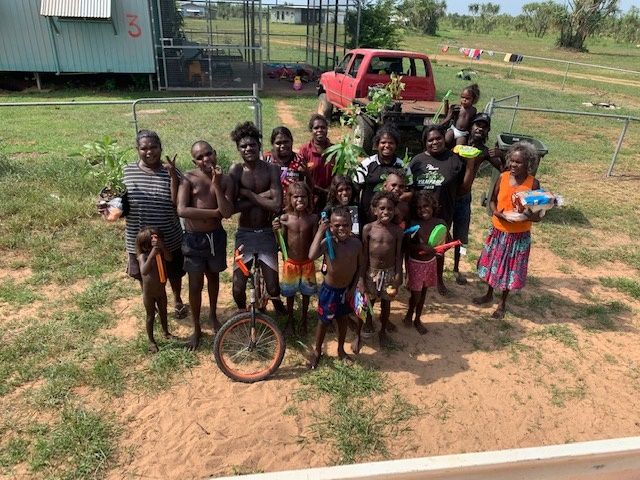
The West Daly Regional Council provides basic housing maintenance and essential municipal services to 13 homelands across 14,070 km2. While they work hard to provide high quality services to support the community, operating in a remote service delivery environment with limited financial resources is a challenge. However, they’ve identified that working with partners to improve service delivery and the quality of life for people in the West Daly region presents great opportunities.
In such extremely remote communities, food security is paramount – many of the homeland communities do not even have a shop and must travel vast distances for basic supplies. Fruit trees are a great resource in any community, as they contribute to support lifelong learning and education from Elders to young children, and promote individual and community health benefits in the form of delicious natural fruits straight from the tree, while enhancing and expanding the communities’ natural food resources.
They developed a project designed to engage community members in growing food and also create shady areas on the two homelands. In total, around 160 fruit trees and 45 shade trees were planted in designated public spaces near parks, ovals, and the local schools. The fruit trees selected included: lilly pillies, medlars, mulberries, custard apples, jaboticas, guavas, mangos and soursops. Shade trees included: native hibiscus, red coondoo, bloodwood and gum trees.
The Council used their $4,946 SRC grant to cover the costs of fruit trees and propagation powder, as well as contribute to freight – which accounted for more than 40% of the total cost of the project.
In Peppimenarti, the tree planting was done in collaboration with Peppimenarti School. About 50 trees were planted around the community with the assistance of Council Staff, CDP, Rangers, community students and teachers, totalling approximately 50 participants. A community barbeque was held after the tree planting to thank the participants for their support on this meaningful community project.
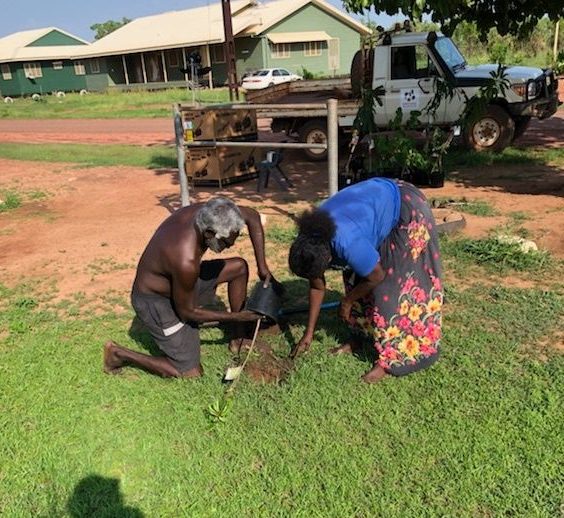
The Nganmarriyanga tree planting day was held in late December and was also a great success, with approximately 50 local men, women and children attending the activity. Trees were also provided to the residents of surrounding homelands such as Merrepen, Nemarluk, Nama and Wudapuli.
The Council provided significant in-kind support via staff labour and travel costs, and also purchased hormone rooting powder, so that cuttings can be taken which will allow further plantings. They have also assumed responsibility for ongoing plant maintenance to ensure the sustainability of the project.
Through this project, community members will gain access to healthy food grown locally, experience increased food security, and improved local plant knowledge. Further, the engagement will bring a positive impact to community spirit and local shade amenity.
“West Daly Regional Council would like to acknowledge the significant contribution of Foundation for Rural and Regional Renewal and its Donor Partner – John T Reid Charitable Trusts for the grant funding for our tree planting in Nganmarriyanga and Peppimenarti; a meaningful project that highly benefits our Indigenous Australians in our remote communities.”
Kristine Matienzo, Grants Manager, West Daly Regional Council

